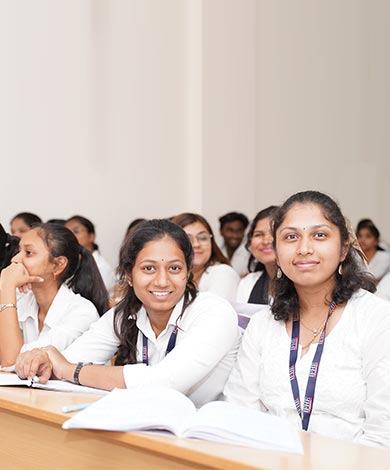Teaching and Evaluation Methodology
- Learning at the ICFAI Law School is student centric and multi-dimensional.

The Law School imparts and trains the student in:
- Lawyering skills
- Advocacy skills
- Drafting skills
- Communication skills
- Negotiation skills
- Articulation skills
- Listening skills
- Research skills
- Balancing the work and time
- Office management
- Court management
- Client management
- Time management
- Stress management
- Team management and coordination
- Resources planning and management
- Technology management
- Court room experiences
- Chamber management
- Horizontal and vertical relationships
- Soft skills
- Client psychology
- Public relations
- Client assessment
- Class room lectures
- Interactions with Judicial officers and advocates
- Court visits and Moot courts
- Internships
- Clinical courses
- Legal aid clinics
- Assignments
- Immersion workshops
- Seminars and workshops
- Simulations
- Co-curricular and extra-curricular activities
- Role plays
- Organizing the functions and events
- Participations in inter college, national level competitions
- Social works
- Group discussions
The learning at ICFAI Law School is multi-dimensional in addition to classroom teaching. A host of activities like Assignments, Moot Courts, Clinical Courses, Legal Aids, Immersion Workshops, Seminars/ Workshops, Internships, Extracurricular Activities etc., are designed to sharpen the domain knowledge of legal profession.
The ICFAI Law School has a unique and innovative approach to legal education that focuses on providing the right knowledge and skills for enduring success in legal careers. As practice precedes theory, more emphasis is placed on the conceptual understanding and application of law. Learning at ICFAI Law School aims to sharpen the professional skills, organizing skills, interpersonal skills and practical learning of a student, through various learning tools like clinical courses, internships, legal aid clinics and court visits.
Internships
- The internships form an important component of law education at ICFAI Law School.
- It is an attempt to bridge the gap between the professional world and academic institutions.
- Internship introduces students to real-life situations. View More
Student Centric Approach
- The ICFAI Law School has student centric approach in designing the curriculum of its five years integrated law programs.
- The programs are blend of theory and practice with an option for student to select the electives of their choice among the alternatives. View More
Self-Study/Seminar Courses
- The ICFAI Law School is offering Self-study and Seminar courses to its students.
- Every student, in addition to the regular courses of the program, may opt for one or two Self study courses during a semester which are Non-Letter Graded courses.
- The Student during his/her tenure in the law school, may elect one or two courses from the list of the courses provided by the law school.
- There will not be any regular class work for the said courses.
- However, a Faculty will be allocated for the courses, the student may consult the said faculty for guidance for completing the course. View More
Some of the topics/courses for self-study are
- Sports Law
- Law Relating to NGOs
- Law Relating to Tribal Population.
- Law Relating to Child Abuse
- Registration and Stamp Duties
- Consumerism
- Climate Change
- Special Economic Zones
- Legal Services Authorities
- Non-Performance Assets in Banks
- Law Relating to the Cooperative Banks
- Bankruptcy Law
- Public and Private Partnerships
- Green Field Airports
Clinical Courses and Legal Aid Projects Court Visits
The students are taken to various courts like High Court, Civil Court, Criminal Court, Family Court and Tribunals, accompanied by the Faculty to enable them to observe the proceedings in the court to learn the court craft and practical part of the legal education.
Guest Lectures
- Eminent academicians and practicing legal professionals are invited for guest lectures wherein students get to understand the applications of various laws and management concepts and ideas.
- Guest lectures are considered as significant learning tools as the students note the experiences of legal professionals directly.
Expert Lecture Series
A series of special lectures by eminent scholars will be arranged for majority of courses.
Mentoring Process
- ICFAI Law School implements mentoring process to help new students joining the law program.
- The students are divided into groups.
- Each group will be mentored by one faculty member from the ICFAI Law School.
- The process is aimed at helping the students to come out of their academic & non-academic problems and streamline their inherent skills towards gearing up for the best career options.
Moot Courts
- The ICFAI Law School believes that the Moot Courts and mock trials play vital role in the learning curve of law students.
- It recognizes that the legal education with the help of Moot Courts participation stimulates the learning zeal of students.
- It also considers that the moot courts are significant tools for law students as they put them into optimum use with commitment under the supervision and guidance of the faculty.
Moot Court Society
- Moot Court Society is a spinal cord of clinical education in law as it provides practical learning and on-job training.
- The Moot court society conducts competitions and selects the team of students.
- The wining team will be directed to participate in National / International Level Moot Court Competitions being organized by various Law Schools / Universities.
- It will be a platform for 360º learning of 21st century skillsets required for new generation lawyers who take challenges of complicated or composite nature of litigations cropping up in the current socio-legal and political environment.